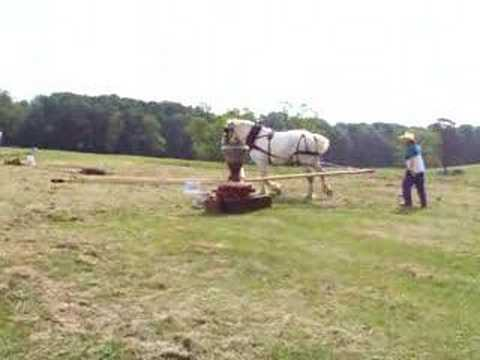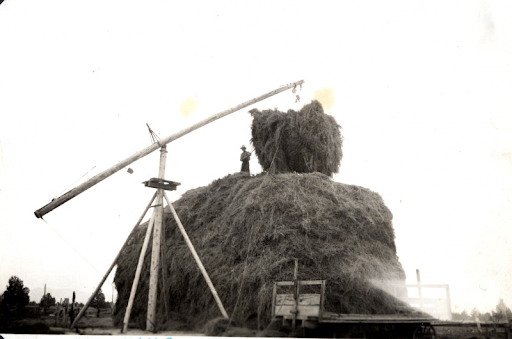Catching The Horses
As a young boy most of the animals on Grandpa’s farm seemed very large to me. Each had their distinctive traits. The pigs always fascinated me. They had floppy ears, stiff hair, and made interesting noises. I definitely sided with their philosophy about mud. They were rarely clean but didn’t seem to mind. But of all Grandpa’s animals, the most intimidating because of their size were his team of draft horses. Even though he had a tractor he still kept those two horses. In my earliest years on the farm, when he hauled loose hay, before giving way to the baling machine, he would use the horses to power the derrick fork to move the hay from the wagon to high up on the stack. He would also use them to pull the hay wagon to and from the field. He would use one to pull the cultivator through the rows of corn and potatoes, rooting out many of the weeds and keeping the soil broken making irrigation more effective. The horse was perfect for this task. He would also hitch one to a machine that would grind whole kernels of barley so it was easier for the milk cows to digest. The horses would trudge mindlessly for hours in a circle, turning those grinding gears until enough barley was ground to last for a while. Once the horses had completed their work for the season, he would take them to a pasture where they would winter. He would check on them every so often but during the winter they didn’t require much. However, those winter months of freedom presented its own problem. After having things their own way for a while, catching them in the spring could prove to be quite a challenge. Just imagine Grandpa and I barreling around that ten acre pasture in the old maroon ‘48 Plymouth, dodging sagebrush, weaving back and forth, trying to drive those horses into a corner where they could be caught. For Grandpa it seemed a frustrating task but for me it was great fun. Having enjoyed their freedom through the cold winter months, they weren’t particularly eager to rejoin the workforce. When he tried to drive them, they were just too quick for him and would easily run past that old car. If we tried to herd them into a corner on foot, they would just as easily elude us, him being too old, I too young, and the dog only making matters worse. It would take far more help than just the two of us to corner them. No matter how much he yelled, cajoled, waved, spat, and cussed, they seemed perfectly able to stay away from us. But when he would take a bucket of barley and shake it so they could tell what it was, they would come running to eat. While eating from the bucket he could easily slip the rope around their necks and put on a halter. It was such a simple thing. I wondered why we spent so much time futilely chasing them from one end of the pasture to the other when all he had to do was bring some grain. His motives went with him to the grave so I can only surmise as to his reasons. The agenda of those two horses was different from Grandpa’s. But when Grandpa was armed with something they wanted, catching them was an easy task. Being able to determine what motivates someone else is a valuable skill. Honestly recognizing self motivation can keep one from getting caught unaware.

